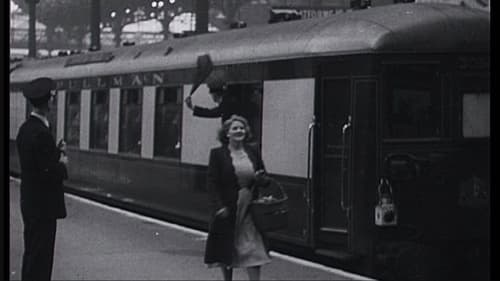Contrathemis (1941)
Género : Animación
Tiempo de ejecución : 4M
Director : Dwinell Grant
Sinopsis
This sequel to Themis similarly simulates the movement of abstract colours and shapes to form distinct visual patterns.

Starting in the late 1930s, illustrator and experimental animator Douglass Crockwell created a series of short abstract animated films at his home in Glen Falls, New York. The films offered Crockwell a chance to experiment with various unorthodox animation techniques such as adding and removing non-drying paint on glass frame-by-frame, squeezing paint between two sheets of glass, and finger painting. The individual films created over a nine-year period were then stitched together for presentation, forming a nonsensical relationship that only highlights the abstract qualities of the images. —Kansas City Electronic Music and Arts Alliance

One of the few Brakhage films featuring spoken dialogue and a central character, this sly and bitter polemic pits an actor (poet? director?) against an unseen audience.

With a similar dreamy mood like its predecessor "Take the 5:10 to Dreamland" (1976) this clip starts with a boy getting into his bed. The camera zooms in into the boy's mind and a slow, sad waltz (i.e."Valse Triste") accompanies images of a locomotive, a miner, the globe, the sky, a sheep heard, etc. Disparate elements, but if one concentrates only at the movement of the figures, one can perceive a commotion, slowly livening up: The starting wheels of the heavy locomotive, the tired miner pushing the heavy cart of coal bricks, the globe smoothly turning around and around, the clouds imperceptibly floating in the sky, the sheep idly moving in the herd, etc. We reach the first climax when a mannequin opens her coat like a flower. The second big crescendo spurts out from a "water hose", after watching schoolgirls doing gymnastics for quite a while. A sad, but nostalgic aftertaste lingers in the end when funeral cars drive away through a flooded area…

A short film by Hollis Frampton.

Sexologists, psychologists, and proponents of sexual freedom, the Kronhausens here attempt to induce erotic response in the audience by carefully chosen visual stimuli and juxtapositions (aimed at both conscious and unconscious). Phallic symbols and open orifices, a tongue licking an orange, an unexpected finger entering the frame: almost any object or act, no matter how innocuous, the Kronhausens show, can be made to appear erotic, and reveals our predisposition towards ‘shaping’ visual evidence for purposes of erotic gratification.

Story about a man whose environment doesn't let him live his simple life.

"Made with spray paint and hand-cut stencils, this film was an attempt at maximum plastic intensity… Places Breer for the first time among the major colorists of the avant-garde." – P. Adams Sitney

Hollis Frampton alludes to origins and creation as he cuts between a garden featuring a bride and groom and an 1902 film entitled "A Little Piece of String."

Director Joseph Cornell evokes the nostalgia of childhood by filming a children's party.

A short film where circus performers entertain children.

A day at the carnival — sensational tent shows where miracles can be seen for the price of admission, boisterous noise of crowds and barkers, shrill and gaudy circus music, the violence of the street ten-fold. This is the substance of Everything Turns, Richter’s first sound film. At its premier at Baden-Baden Richter got into a fight with two Nazi officials who disliked the film's ‘modernism.’ Yet in 1936 it was awarded first prize for artistic merit by the Nazis, with Richter’s name suppressed from the credits. He had long since left Germany.

Another street scene from the Lumiere company

London to Brighton in 4 minutes BBC interlude. From the days when TV was all live and programming was hectic. Often when one program finished, the next one was not ready yet, and the gap had to be filled. So the BBC developed a number of interludes to fill these gaps, this being the most famous one.

A high-speed view of Paris via train-track; Zooming down the Seine by boat. Chomette's first film, Games of Reflections and Speed, traverses tunnels and elevated railways to produce a disarming rhythm.

An experimental animated short film in which a piano plays a song and the keys, hammers, and various other parts of the piano are different colors.

A butchered cow is decapitated in this short film by Hollis Frampton.

The camera pans across a field of flowers at extreme speeds in this short film by Hollis Frampton.

A series of ghost-like vehicles drive by in this short film by Hollis Frampton.


